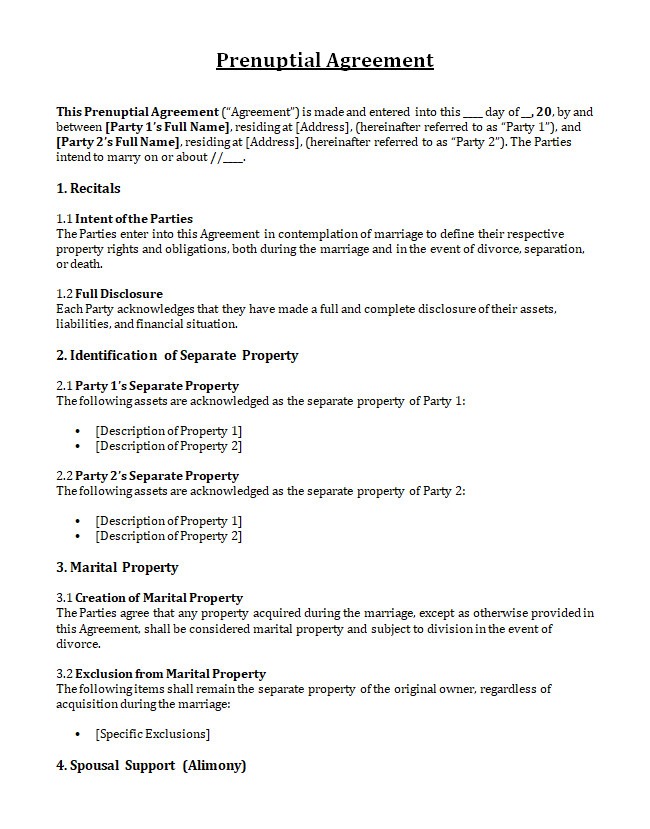A prenuptial agreement, commonly known as a prenup, is a legally binding contract entered into by a couple before they get married or enter into a civil partnership. It outlines how their assets, debts, and other financial matters will be divided in the event of a relationship breakdown.
Prenuptial agreements are customizable and can cover various aspects, such as property division, spousal support, and the handling of joint debts. The exact details of a prenup vary depending on the couple’s specific circumstances and requirements.

What is the purpose of a prenuptial agreement?
The primary purpose of a prenuptial agreement is to provide clarity and certainty for couples in the unfortunate event of a relationship breakdown. It allows them to define their financial rights and responsibilities before entering into marriage or a civil partnership.
By having a prenup in place, couples can establish a clear framework for dividing their assets and debts, which can help prevent lengthy and costly legal disputes in the future. It also allows individuals to protect their separate property or assets acquired before the marriage or partnership.
Why should I have a prenuptial agreement?
Having a prenuptial agreement offers several benefits for couples:
1. Financial Clarity:
A prenup provides a comprehensive outline of how assets and debts will be divided, ensuring both parties have a clear understanding of their financial rights and obligations.
2. Protection of Separate Property:
If you have significant assets or property that you acquired before the marriage or partnership, a prenup can protect those assets from being subject to division in the event of a divorce or separation.
3. Avoiding Lengthy Legal Battles:
By addressing financial matters in advance, a prenup can help minimize conflicts and potential legal disputes, saving both time and money.
4. Future Financial Security:
A prenup can include provisions for spousal support or alimony, ensuring that both parties are financially protected even after the relationship ends.
5. Protecting Family Assets:
If you have children from a previous relationship or family heirlooms, a prenuptial agreement can safeguard those assets and ensure they are passed down to the intended beneficiaries.
What should be included in a prenuptial agreement?
A prenuptial agreement should cover the following key aspects:
1. Asset and Debt Division:
Specify how assets, such as property, investments, and savings, will be divided between the couple. Also, address the allocation of any joint debts or financial obligations.
2. Spousal Support:
Outline the terms and conditions for spousal support or alimony payments, including the duration and amount, if applicable.
3. Inheritance and Family Assets:
Clearly define how inheritance, family assets, and any future acquisitions will be handled in the event of a relationship breakdown.
4. Child Custody and Support:
If applicable, address the custody and financial support of any children from the relationship, including education, healthcare, and living arrangements.
5. Legal Jurisdiction:
Specify the jurisdiction that will govern the prenuptial agreement and any potential disputes that may arise.
What does a prenuptial agreement protect?
A prenuptial agreement protects the following:
1. Personal Assets:
Assets acquired before the marriage or partnership, such as property, investments, and savings.
2. Business Interests:
Ownership stakes in businesses or professional practices that were established before the marriage or partnership.
3. Inheritance:
Inherited assets or family heirlooms that you wish to keep separate from the marital or partnership assets.
4. Debt Allocation:
Clearly defines the responsibility for any joint debts or financial obligations incurred during the relationship.
5. Spousal Support:
Specifies the terms and conditions for spousal support or alimony payments, providing financial certainty for both parties.
How long does a prenuptial agreement last?
A prenuptial agreement lasts for the duration of the marriage or civil partnership. However, it can be amended or revoked by mutual agreement between the parties involved.
It is advisable to review and update the prenup periodically, especially when significant changes occur in the couple’s financial circumstances or if there are changes in applicable laws.
Conclusion
A prenuptial agreement is an essential tool for couples seeking clarity and protection in the event of a relationship breakdown. It allows couples to define how their assets, debts, and other financial matters will be divided, providing peace of mind and avoiding potential legal disputes.
By addressing important financial considerations in advance, couples can ensure a smoother transition in the unfortunate event of separation or divorce. Having a prenup in place promotes transparency, protects personal assets, and allows both parties to plan for their future financial security.
Prenuptial Agreement Template – Word